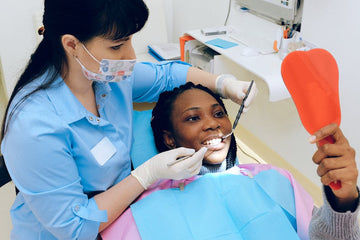What is CPAP therapy and why is it important?
CPAP therapy, which stands for Continuous Positive Airway Pressure therapy, is a widely used treatment for sleep apnea. Sleep apnea is a common sleep disorder characterized by pauses in breathing or shallow breaths during sleep. CPAP therapy involves wearing a mask that delivers a constant flow of air pressure to keep the airway open, allowing for uninterrupted breathing throughout the night. It is important because untreated sleep apnea can lead to a range of health problems, including high blood pressure, heart disease, and daytime fatigue. CPAP therapy not only improves the quality of sleep but also reduces the risk of these complications, ensuring a healthier and more restful night's sleep.

The three main types of CPAP masks
The three main types of CPAP masks include nasal masks, nasal pillow masks, and full-face masks. Each type serves a specific purpose and caters to different needs and preferences. Nasal masks cover the nose and are the most common type, providing a secure fit and effective therapy. Nasal pillow masks, on the other hand, deliver air directly into the nostrils, making them a suitable option for those who prefer a more minimalistic design. Lastly, full-face masks cover both the nose and mouth, ensuring a reliable seal for individuals who breathe through their mouth or experience nasal congestion. Understanding the differences between these mask types is crucial in finding the most comfortable and effective option for successful CPAP therapy.
Full face masks: benefits and drawbacks
Full face masks are one of the three main types of CPAP masks, and they offer unique benefits and drawbacks for sleep apnea patients. These masks cover both the nose and mouth, ensuring a secure and effective seal for those who breathe through their mouth or experience frequent nasal congestion. The full-face design also eliminates the need for additional chin straps, providing a more comfortable and hassle-free experience. However, some users may find full face masks bulkier and less comfortable than other options, and they may experience more air leaks due to the larger surface area. It is important to consult with a healthcare professional to determine if a full face mask is the right choice for your specific needs and sleep apnea symptoms.
Nasal masks: benefits and drawbacks
Nasal masks are one of the most popular types of CPAP masks, and for good reason. They offer several benefits that make them a preferred choice for many CPAP users. One of the main advantages of nasal masks is their compact design, which allows for a comfortable fit and ease of use. Additionally, nasal masks provide a more natural breathing experience by delivering the air directly through the nose, mimicking the natural airflow. However, it's important to note that nasal masks may not be suitable for everyone. Some individuals with nasal congestion or chronic allergies may find it difficult to breathe through their nose, making nasal masks less effective. It's always recommended to consult with a healthcare professional to determine the best CPAP mask option for your specific needs and requirements.
Nasal pillow masks: benefits and drawbacks
Nasal pillow masks are a popular option for CPAP users due to their unique design and numerous benefits. These masks consist of small cushions that fit directly into the nostrils, providing a comfortable and secure seal. One major advantage of nasal pillow masks is their minimalistic design, which allows for a wider field of vision and less bulkiness on the face. Additionally, these masks are often more lightweight and easier to travel with compared to other types of CPAP masks. However, it's important to note that nasal pillow masks may not be suitable for everyone, especially those who require higher pressure settings or have nasal congestion. It's always recommended to consult with a healthcare professional to determine the best CPAP mask option for your specific needs.
Factors to consider when choosing a CPAP mask
When choosing a CPAP mask, there are several factors to consider to ensure optimal comfort and effectiveness. One important factor is the mask type. There are three main types of CPAP masks: nasal masks, nasal pillow masks, and full face masks. Nasal masks cover the nose and are a popular choice for those who breathe through their nose. Nasal pillow masks, on the other hand, use small inserts that seal around the nostrils, providing a more minimalistic and lightweight option. Lastly, full face masks cover both the nose and mouth, making them suitable for individuals who breathe through their mouth or have nasal congestion. Understanding the different mask types and their unique features is essential in finding the perfect fit for your individual needs and preferences.
Tips for finding the right fit and adjusting the mask
Finding the right fit and adjusting your CPAP mask is crucial for successful and comfortable sleep apnea treatment. Each individual has unique facial features and preferences, which means that there is no one-size-fits-all solution when it comes to CPAP masks. To find the perfect fit, it is important to consider factors such as the shape of your face, the position you sleep in, and any specific comfort needs you may have. Additionally, adjusting the mask properly can help prevent air leaks and ensure an effective seal. By understanding the different types of CPAP masks available and following these tips, you can optimize your sleep therapy experience and enjoy a restful night's sleep.
Common problems and solutions with CPAP masks
Common problems with CPAP masks can often be resolved with simple solutions. One common issue is mask leakage, which can result in air escaping and compromising the effectiveness of the therapy. This can be addressed by ensuring a proper fit and adjusting the straps accordingly. Another problem is discomfort or skin irritation caused by the mask. To alleviate this, using a mask liner or trying a different type of mask material can make a significant difference. Additionally, some individuals may experience difficulty breathing through the nose, leading to mouth breathing during sleep. A full face mask or a chin strap can help keep the mouth closed and promote nasal breathing. By understanding these common problems and their solutions, individuals can optimize their CPAP therapy and experience a more comfortable and effective sleep apnea treatment.
How to clean and maintain your CPAP mask
Proper cleaning and maintenance of your CPAP mask is essential for not only ensuring its longevity but also for your overall respiratory health. Many CPAP users may not realize the importance of regularly cleaning their mask, but neglecting this crucial step can lead to a buildup of bacteria, allergens, and oils, which can result in skin irritation and even respiratory issues. To clean your CPAP mask effectively, it is recommended to use mild soap and warm water, ensuring all components are thoroughly washed and rinsed. Additionally, it's important to regularly replace the mask's filters and inspect for any signs of wear and tear. By incorporating these simple cleaning and maintenance practices into your CPAP routine, you can ensure a comfortable and hygienic sleep therapy experience.
Conclusion: Finding the right CPAP mask for your needs
Finding the right CPAP mask for your needs is crucial for effective sleep apnea treatment. There are several different types of CPAP masks available, each with its own unique features and benefits. Nasal masks cover only the nose and are a popular choice for those who breathe primarily through their nose. Full face masks cover both the nose and mouth, making them suitable for mouth breathers or those who experience nasal congestion. Nasal pillow masks have small cushions that seal around the nostrils, providing a more minimalistic and comfortable option. It's important to consider factors such as personal preference, facial structure, and any existing respiratory conditions when choosing a CPAP mask. By understanding the different types of CPAP masks and their advantages, you can make an informed decision and find the mask that will help you achieve restful sleep and improved overall health.



